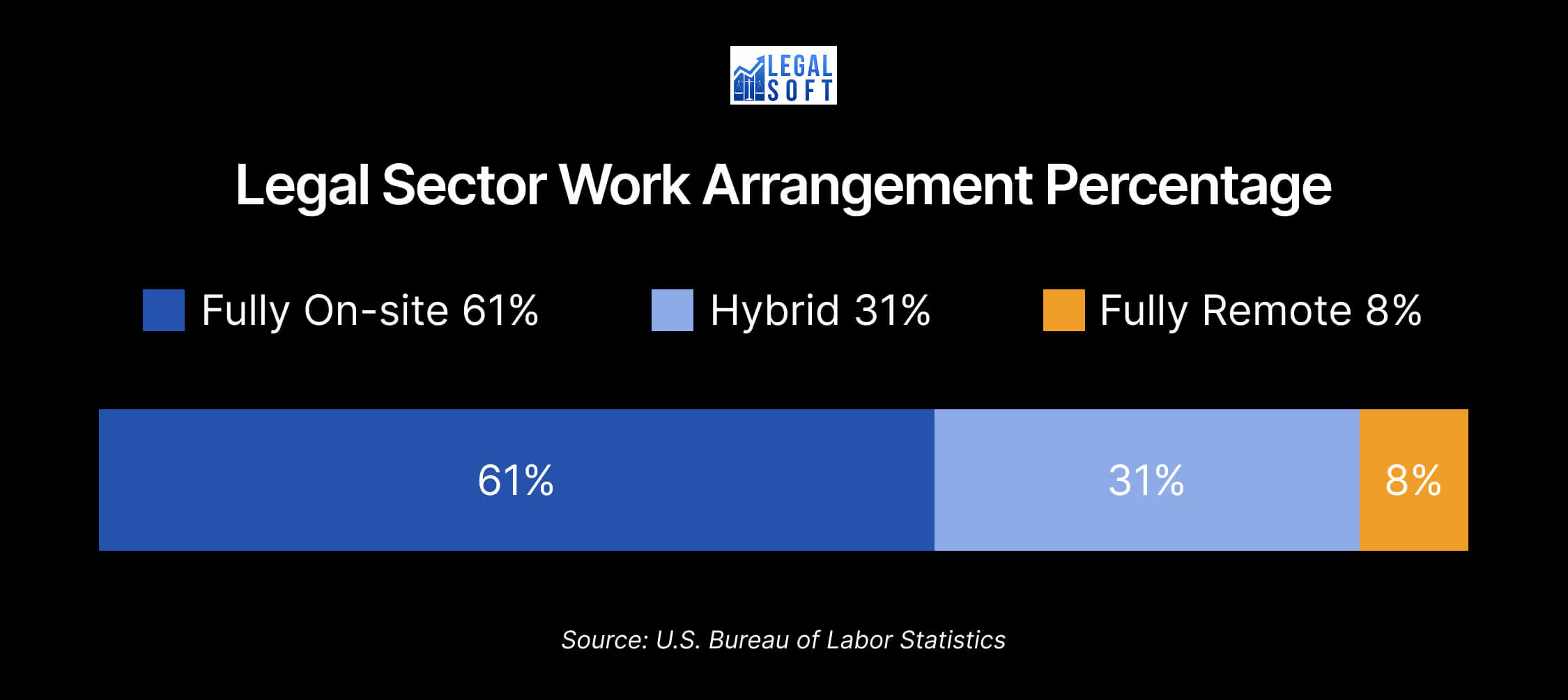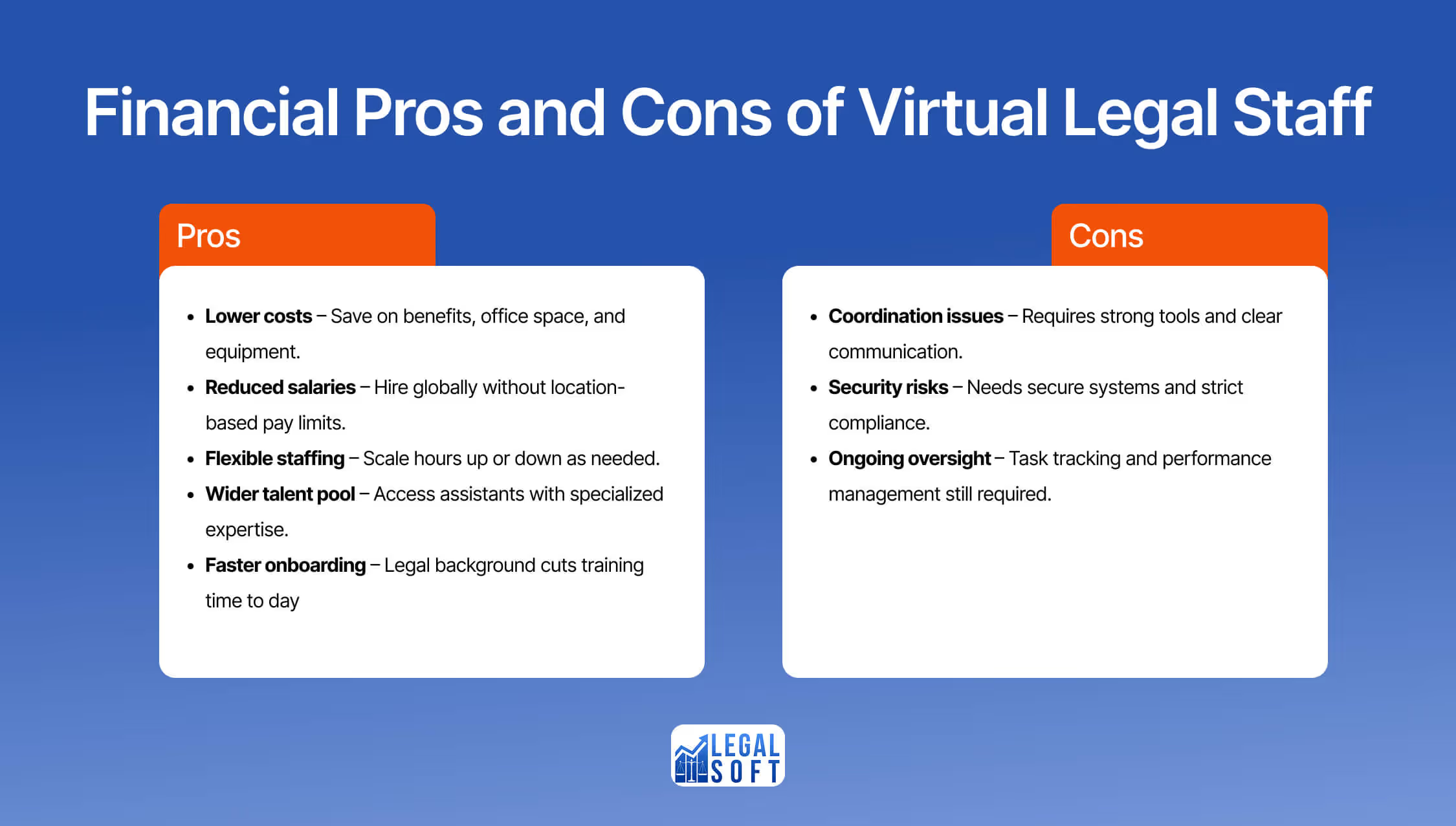If you've looked closely at your firm's budget, you understand the costs that are often overlooked. Overhead expenses like operational costs, office space, equipment, and employee benefits can eat into your profits. Every dollar spent on administrative overhead is a dollar that doesn’t go toward growing your practice or increasing your take-home pay.
The legal industry is undergoing a fundamental shift in how work gets done. Recent data from the American Bar Association shows that 87% of law firms now allow lawyers to work remotely, signaling a major transformation in workplace flexibility.
The numbers tell an even more compelling story. The U.S. Bureau of Labor Statistics' 2025 legal market overview shows that 31% of legal professionals work in hybrid setups, with another 8% working entirely remotely. This shift isn't just about convenience. It's about rethinking how legal services are delivered and how firms manage their bottom line.

This transformation raises a compelling question: could virtual legal assistants be the key for law firms to save money? Let’s examine whether this work model actually delivers on its promise of cost savings.
Why Virtual Work Is on the Rise
The movement toward remote legal work isn't just about following trends. It's driven by what legal professionals actually want and what firms can no longer ignore financially.
Data on workforce expectations shows a clear generational shift. According to the American Bar Association, nearly half of younger lawyers with less than 10 years of experience view remote work flexibility as a make-or-break factor when evaluating job opportunities. Surveys of support staff show similar enthusiasm for hybrid or remote arrangements, making flexibility a crucial factor in talent retention.
And here’s the financial pressure you can’t ignore: overhead costs alone account for 45% to 50% of total expenses at small law firms, according to Law Crossing. When nearly half your budget goes to overhead, any opportunity to optimize those costs deserves serious consideration.
Technology has eliminated most of the barriers that once made remote legal work impractical. Cloud-based practice management platforms, encrypted communication tools, secure document-sharing systems, and digital signature solutions now enable the same tasks once limited to in-house legal assistants.
Today, virtual legal assistants can handle client intake, legal research, case management, and document preparation from anywhere. What once required physical presence in an office can now be accomplished securely from a home office—across town or even across the country.

Are Law Firms Spending More on Legal Operations?
Before evaluating any cost-cutting strategy, it’s important to understand industry-wide spending trends. The reality is that legal operational costs are climbing across the board.
The Thomson Reuters Institute’s 2023 State of Corporate Law Departments report reveals that at least one in three corporate law departments at global organizations with revenues exceeding $1 billion project a rise in their legal spend. The projected growth varies by region, with some markets anticipating increases of more than 50%, while others expect more modest, but still concerning, growth in the 30% range.
What’s driving these costs? Regulatory matters, labor and employment issues, and litigation expenses continue to push legal spending upward. For law firm leaders, understanding these broader trends explains why controlling operational expenses has become crucial for maintaining profitability. If your budget feels tight, you’re not alone. The real question is: where can you trim costs without sacrificing quality?
How Much Money Can I Save with a Virtual Legal Assistant?
Let's cut through the speculation and look at actual numbers. Here’s a realistic comparison of the annual costs of hiring an in-house legal assistant versus a virtual alternative:
In the first year alone, an in-house legal assistant costs more than $95,510, while a virtual legal assistant averages $26,724. That’s a savings of $68,786, or 72% for your firm.
And here’s what makes it even more compelling: these figures don’t account for the long-term gains of increased billable hours. With a virtual assistant, you can scale support based on your actual caseload rather than carrying fixed overhead.
Financial Pros and Cons of Virtual Legal Assistants

Every business decision involves trade-offs. Here's what you're gaining, and what you may need to account for.
Pros:
- Lower operational costs – Eliminating expenses for benefits, office space, and equipment.
- Reduced salary costs - Hiring globally removes location-based pay constraints, allowing you to access top talent in regions with lower costs of living.
- Adaptable staffing levels – Scale support hours up during busy periods and down during slower times without the burden of employment contracts or terminations.
- Broader talent pool – Access legal assistants with specialized knowledge or experience in specific practice areas.
- Faster onboarding – Many virtual legal assistants already have legal backgrounds, reducing training needs and cutting onboarding from weeks to just days.
Cons:
- Coordination challenges – Lack of in-person interaction may require investment in collaboration tools and clear communication protocols.
- Security considerations – Handling confidential client data remotely demands secure systems, encryption, and well-defined compliance measures.
- Supervision requirements – Like in-house staff, you’ll still need to invest in task management, time-tracking, and performance oversight tools.
What's the ROI of Hiring a Virtual Legal Assistant?
Many attorneys face challenges in keeping their practice profitable and efficient. On average, lawyers spend just 2.9 hours of each workday on billable work, with the rest consumed by non-billable administrative tasks.
Consider what this means in practical terms: if you bill at $250 per hour and delegate administrative work to reclaim even two additional billable hours each day, you're generating an extra $500 in daily revenue. That's about $10,000 monthly in new income.
By offloading non-billable tasks to a virtual legal assistant, you unlock more time for high-value, revenue-generating work. Instead of being weighed down by administrative duties, you can focus on what truly requires your legal expertise, making your practice more productive and profitable.
Use our Virtual Assistant ROI Calculator to see an accurate estimate of your potential savings and revenue growth.
Making the Decision: Is It Right for Your Practice?
Virtual legal assistants aren't the optimal choice for every firm. Your decision should align with how your practice actually operates.
Virtual assistants make sense when:
- Your work involves research, case management, and documentation that doesn’t require a physical presence.
- Your systems and processes are well-documented and can be followed remotely.
- Your clients are comfortable with digital communication and video conferencing.
- Your workload fluctuates and you need flexible staffing.
- You want to reduce overhead without sacrificing service quality.
In-house staff may be preferable if:
- Your practice requires frequent court appearances.
- Your clients expect face-to-face interaction with your entire team.
- You need staff to manage office operations or greet walk-in clients.
For many practices, the most effective solution is a blended model: maintaining a core in-house team for client-facing roles while leveraging virtual assistants for research, documentation, and back-office support. This approach captures the cost advantages of remote staffing while preserving personal service where it matters most.
Conclusion: Start Saving
Hiring a virtual legal assistant can save law firms money, and it offers a clear financial advantage beyond the numbers. You’ll also free up valuable time to focus on complex cases and client relationships. With increased billable capacity and reduced administrative burdens, most practices see a positive ROI within months, with annual savings potentially reaching $68,786 per virtual legal assistant compared to traditional hiring.
If you’re considering virtual legal support, we’d be glad to discuss your specific needs and help you build a personalized approach for your firm.








